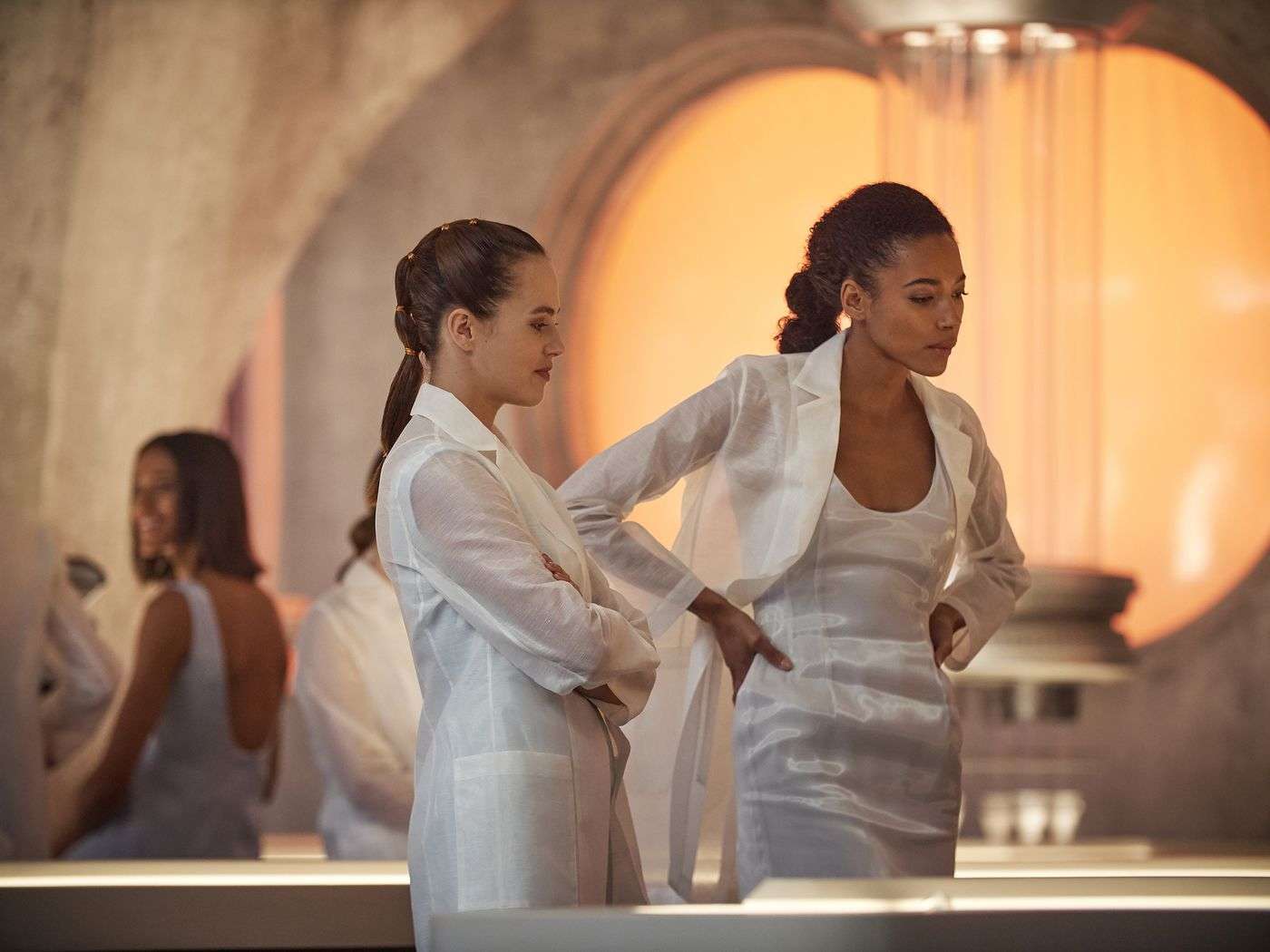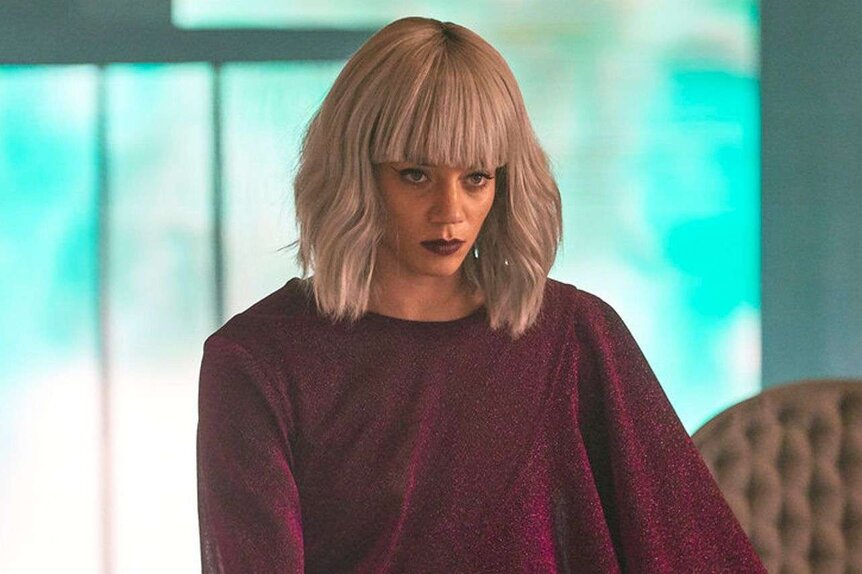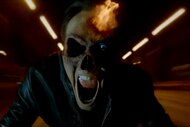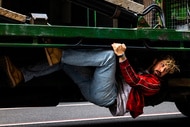Create a free profile to get unlimited access to exclusive videos, sweepstakes, and more!
Brave New World showrunner: Aldous Huxley 'wouldn't be very surprised' by the changes

Brave New World, Peacock’s new original series, isn’t a direct adaptation of the original book. That’s to be expected, though, in part because author Aldous Huxley published Brave New World almost 90 years ago, in 1932. Even ignoring the sorts of changes required for converting a literary classic into a TV show, the real world’s gotten a lot newer since Huxley wrote of a secretly dark utopian future driven by pleasure and mind-numbing drugs. However, showrunner David Wiener says that he and the other minds behind the series “wound up being even more faithful [to the book] than probably we intended.”
“It is actually an easy book to be faithful to, on some level, because the premise is so strong,” Wiener tells SYFY WIRE ahead of the premiere on Peacock. “The remarkable thing was that we wound up actually hitting a lot of the same plot points as Huxley did, but we get there in a very different way.”
The TV show’s version of New London, a seemingly perfect society where every pre-designed embryo is sorted into a caste and people live about their station without monogamy, religion, money, or any burdens of ownership, is similar to the book. There are, of course, some changes. Huxley was quite prescient when writing Brave New World, foreseeing the development of major innovations like in vitro fertilization and oral contraceptives, but one thing he didn’t see coming was the internet — and with it, social media.
“I think Huxley wouldn't be very surprised,” Wiener says. “He might be disappointed, but I think it seems to be an extension of what he was focused on and warning against.”
To that end, the TV show adds a Black Mirror-style interface where citizens like Bernard Marx (Harry Lloyd), an Alpha+, meaning he’s part of New London’s most elite, can see everyone else’s rank — and themselves be monitored when they take the contact out. (Privacy didn’t exist in Huxley’s original New London, so it only tracks that current-day privacy concerns would find their way into a modern adaptation.) Similarly, the TV show features an artificial intelligence that designed the titular Brave New World, and it explores how the World State was built, elaborating on Huxley’s original writing that explained why it came about.
Some shifts, though, are due to changing times. New London is a diverse society, and although the caste system discriminates, in the show it doesn’t do so by race. That wasn’t the case in the book, which was much more racist in its class breakdown.
“The book is problematic [in] how it deals not only with race, but also with gender roles and, you know, it’s kind of a very conventional idea of sexual attitudes of its time,” Wiener says.
Even if Huxley wasn’t exactly endorsing those views, personally (New London isn’t ultimately presented as a good or just society), recreating that racism in a modern TV show would mean just another major series with no real diversity to speak of. It’s a similar problem that Hulu’s The Handmaid’s Tale faced, although a race-blind approach isn’t without its own issues, too. Brave New World opted for a more diverse cast of characters, including making the originally white male author Helm Watson into a woman of color (played by Ant-Man and the Wasp's Hannah John-Kamen). As important as it is to have representation on TV, Wiener says it makes sense that New London would be diverse. It’s supposed to be a utopia, after all.
“We wanted to kind of show a utopia was as diverse as, hopefully, the future will be,” he explains, adding that there are still some parallels to be found even though the show’s caste system doesn’t divide people by race.
One thing that didn’t change from the book? The sex. New London is a promiscuous society, something that Wiener says was always going to be part of the show, even when it was being developed for network TV rather than Peacock, which, as a streaming service, can show more than viewers might otherwise see while channel-surfing.
“I think [executives] realized there was no way to adequately serve the idea of New London without being able to show how New Londoners achieve pleasure and how they spend their time and how their attitudes in terms of modesty and sexuality are different than us,” Wiener says. But, in perhaps another way of showing how our culture has evolved, behind the scenes, he stresses that the series’ intimacy coordinator, Ita O’Brien, was essential to bringing New London to the screen safely, respectfully, and consensually.
“She empowered everybody and everyone felt really secure, and it kind of demystified [the sex and nude scenes] in a way that allowed everybody to kind of be free in the way that New Londoners would be,” Wiener says, also complimenting his actors for being “brave enough to go there.”
All of this results in a version of Brave New World that feels both of-the-moment and indebted to its trailblazing, nearly century-old book. And, before you ask, Wiener is aware of the irony that, ultimately, Brave New World, a work about a populace who have been made complacent with titillating pleasure and entertainment, is now yet another new series on yet another streaming service.
“We don't expect that irony to be lost on the audience either,” Wiener says with a laugh. He actually leaned into it. The fake commercials for The Savage Lands and new varieties of Soma were intended to blend seamlessly with real commercials, back when Brave New World was being developed for ad-supported TV.
“On some level, we are part of what Huxley was concerned about,” Wiener says. “At the same time, I hope ultimately that awareness and that intentional irony allows people to ask the questions that I think Huxley would want them to ask.”
SYFY WIRE and Peacock are both owned and operated by NBCUniversal.



























